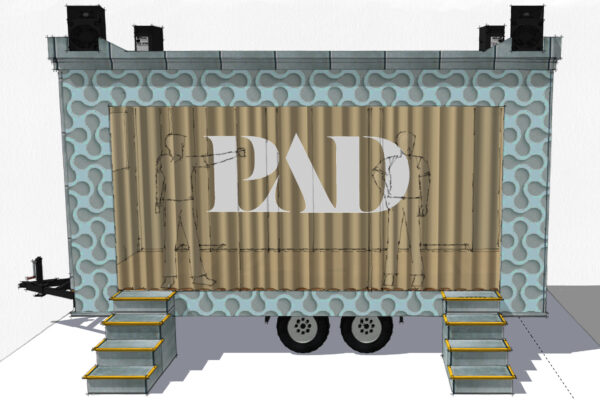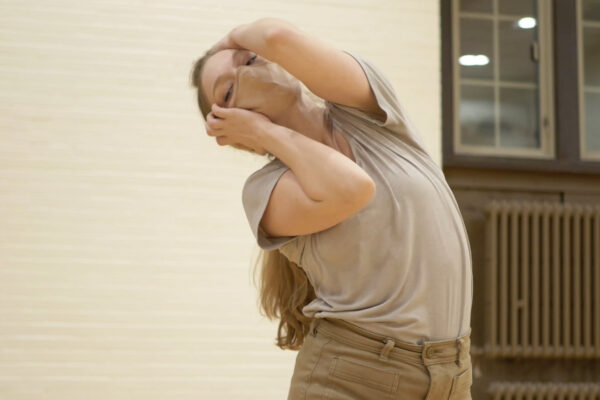Black: Is my script perfect?
White: Artistic perfection doesn’t exist.
— Chauncy Thomas, “The Nicest White People That America Has Ever Produced”
“How the heck are we going to do this?”
It was the summer of 2020 and Andrea Urice, teaching professor of drama, was contemplating the coming season. As COVID-19 continued to rage, theaters around the nation had closed their doors. Vaccines were months, if not years, away.
But for Urice and colleagues in the Performing Arts Departments in Arts & Sciences, live events are central to the teaching mission. Each year, scores of PAD students stage dozens of performances reaching thousands of audience members. Cancellation was not an option.
“Nothing we’d planned was feasible,” Urice remembers. “So the production committee was starting over, kicking around ideas. We knew this entire season was going to have to be filmed. And we thought, we have a lot of really excellent alumni working professionally as playwrights and screenwriters.
“What if we turn to them?”

Demolishing everything
We were all home all the time, all unemployed.
— Marisa Wegrzyn, “Solastalgia”
Historically, WashU has boasted an astounding array of dramatic talent, from Tennessee Williams and Shepherd Mead to Harold Ramis and Steven Sater. But over the last two decades, playwright-in-residence Carter Lewis — a two-time nominee for the American Theatre Critics Award — has mentored a generation of young dramatists.

“Carter is very encouraging,” says Chauncy Thomas, AB ’06, a New York–based actor and writer. “I don’t remember ever being stressed out in playwriting class. But he’s also very honest about whether something is working or whether it’s off the mark. And that’s what writers need.”
Thomas recalls that when COVID-19 reached New York, in March 2020, it hit the theater scene like a bomb. “It just demolished everything.” Shows closed, work dried up. Zoom readings and other small projects helped make ends meet, but the city seemed to be holding its collective breath.
Then, in early August, Lewis reached out. The PAD was commissioning four original works. The charge was simple. Each would be under 25 minutes, with no more than four characters. Playwrights could utilize a few basic scenic elements — a table, chairs, a stair unit, a door — and should be mindful of social distancing.
“Nobody’s hugging in these plays,” Thomas quips. Otherwise, “it was pretty wide open.”
Space and grace
You have to plan it out before the weather changes.
— Nastaran Ahmadi, “Amateurs”
In addition to Thomas, Lewis reached out to Nastaran Ahmadi, AB ’00, Liza Birkenmeier, AB ’08, and Marisa Wegrzyn, AB ’03. All four submitted drafts by Nov. 1. Production began in earnest with the spring 2021 semester. For visiting director Jacqueline Thompson, it came as a relief.
“I’d been teaching online for almost a year,” Thompson remembers. “Just coming back into a space, being with people, figuring out a process — it was trippy!”
Thompson, who’d previously worked with Thomas at The Black Rep and the New Jewish Theatre, was tapped to direct his “The Nicest White People That America Has Ever Produced” as well as Birkenmeier’s “Fear Is a Gift.” Urice took the helm of Ahmadi’s “Amateurs” and Wegrzyn’s “Solastalgia.”
Still, pandemic rehearsals could be challenging. “Directing people in masks, I don’t know what their faces are doing,” Thompson says with a laugh. She also noticed that hours spent breathing and projecting through masks were taxing for the cast. She shortened some sessions, to guard against fatigue, while moving others to Zoom.
“This project was very experimental,” Thompson adds. “I had to give myself the space and grace to make adjustments.”

Distress and flexibility
Sister: Never say never. Time is infinite.
Brother: Yes, but we aren’t.
— Nastaran Ahmadi, “Amateurs”
Filmed on the Edison Theater stage, and streamed through the PAD website, the plays share structural similarities. All four writers elected to feature just two characters, and all four films were shot using multiple cameras in a single “live” take. But where “Amateurs” and “The Nicest White People…” showcase bantering, slow-burn dialogue, “Fear Is a Gift” and “Solastalgia” include characters speaking directly to the viewer.
“There was uncertainty about how the plays were going to be produced,” says Wegrzyn, a writer and producer for the Amazon TV series “Goliath.” “I was also thinking about how they’d be consumed by an audience — on a computer screen — and thought direct address would make for an intimate experience.”
Set in Los Angeles, “Solastalgia” centers on Chris (Catherine Herlihy) and Alex (Sarah Beshke), roommates since college, whose relationship is tested by a freeloading (and off-camera) boyfriend. The title, a portmanteau of solace + nostalgia, describes the existential distress caused by climate-induced environmental change.
“It was like my pandemic anxiety and California wildfire anxiety and unemployment anxiety dumped into a couple characters working out their strained friendship,” Wegrzyn says. At the same time, “I wrote the script to be flexible. I didn’t even provide stage directions or setting or character descriptions. It was all dialogue.
“It could have been an audio play if that suddenly became an option.”

To watch performances, visit https://pad.wustl.edu/homecoming-voices-performance.
Inside the tornado
Your first script was about Black people. This script’s about race.
– Chauncy Thomas, “The Nicest White People That America Has Ever Produced”
In “The Nicest White People…,” Thomas explores the intersection of race, power and artistic integrity. When a Black writer (Jenise Sheppard), smarting from a script rejection, turns to a white director (Alexander Hewlett) for blunt feedback, their old and seemingly comfortable friendship falls into fraught debate. Can art transcend social environment? Should it even try? Or are the ways artists view the world inevitably constrained by the ways the world views them?
“I always start with a question,” Thomas says of his writing process. “I’m intrigued by a problem, but I don’t know the answer and let the two sides of my brain debate. It’s like I’m in a tornado, sentences are swirling around, and I try to grab them. What kind of story can we make?”
During rehearsals, Thomas frequently joined the cast and crew for Zoom rehearsals. Watching Sheppard and Hewlett embody the characters provided fresh insight into how their story builds, prompting Thomas to re-write the last several pages. He was impressed by the actors’ ease in pivoting from sly one-liners to raw, heartbreaking emotion.
“My philosophy is, life is funny until it’s not, and even then, it’s still a little funny,” Thomas says. “They really nailed it.”

Fear and resilience
Like if we trust our fears.
If we actually trust our fears.
That’s less scary than fearing them.
— Liza Birkenmeier, “Fear Is a Gift”
In “Amateurs,” Ahmadi — who is currently developing a half-hour comic-drama based on her teenage years — introduces a pair of siblings. A rootless brother (Nathaniel Holmes), long absent from the family home, attempts to reconcile with the sister (Maya Horn) who stayed to care for their dying mother.
“Nastaran is a clever, funny writer as well as one of my first students at Washington University,” Urice says. “It’s been a real treat to work with her again.” Though “Amateurs” doesn’t address the pandemic directly, it does grapple with themes of mortality, isolation and forgiveness. “It’s an intimate story, and I think, residing at the heart, there’s a fear of the loss of connection.”
In “Fear Is a Gift,” Birkenmeier — a recent playwright-in-residence at New York talent hub Ars Nova — follows true-crime enthusiasts Savannah (Brenna Jones) and J (Stephanie Berger) as they narrate a neighborhood bike tour/podcast. Yet as the pair describe a handful of local murders, including one perpetrated by Savannah’s manicurist, the chipper tone grows increasingly pensive.
“The actors and I talked a lot about light and dark energy,” Thompson says. “Savannah and J can sound like they’re talking about gardening, except that they’re actually talking about murder. And their relationship seems to mirror one of the stories, so there’s also an element of mystery. It’s been a lot of fun to unpack.”
Thompson adds that, during rehearsals, she was struck by the degree to which all four authors explored the element of fear. But now, viewing the completed films together, what jumps out is the shared attention to the fragility and resilience of human relationships. “It just vibrates through them all.”
For Urice, that resilience is also embodied by the production process. After a year of COVID-19, “Just getting back together and being able to make some art … it’s been a real privilege.”










